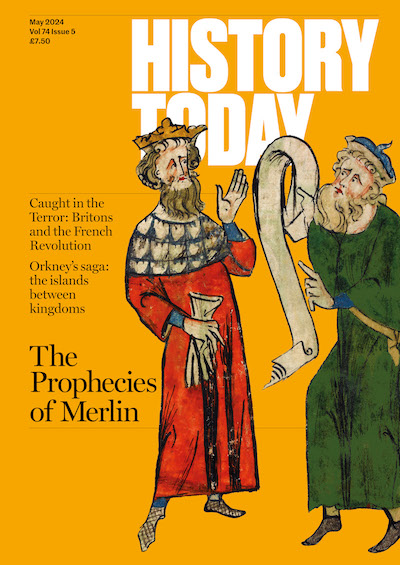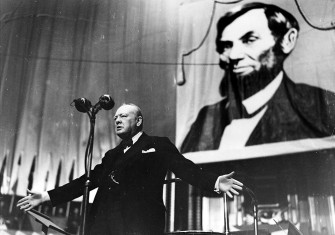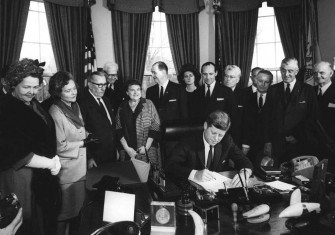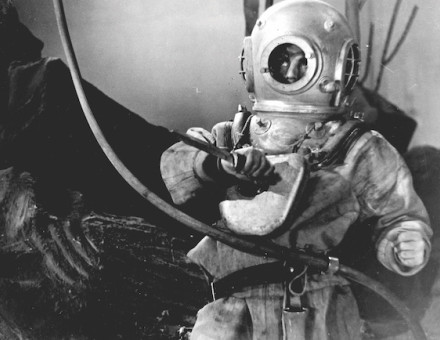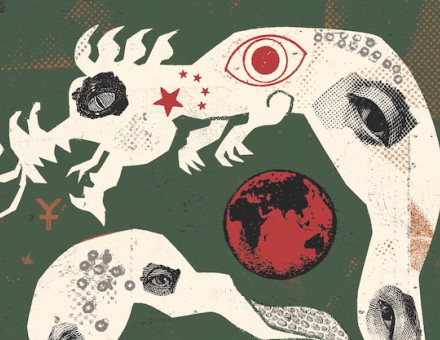‘Churchill’s American Network’ and ‘Mirrors of Greatness’ review
Cita Stelzer’s Churchill’s American Network and David Reynolds’ Mirrors of Greatness seek to bring Churchill’s contemporaries and adversaries out of his shadow.
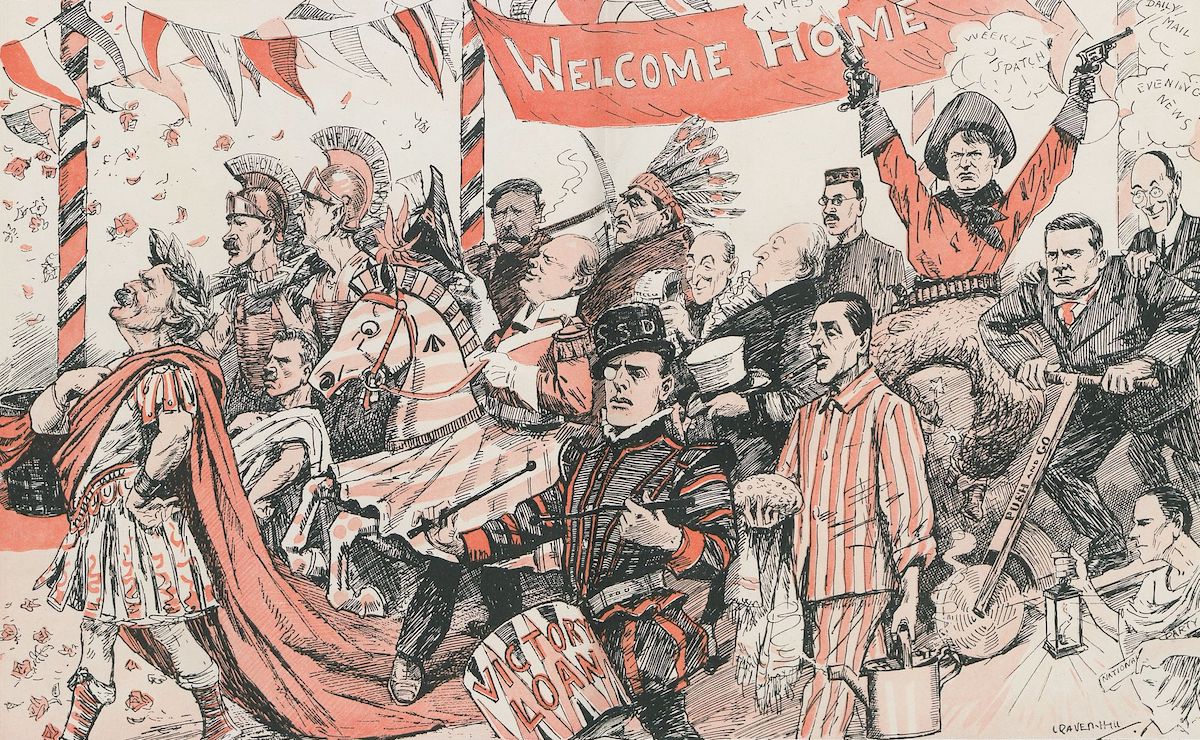
For seven decades the powerful, influential and successful beat a path to Winston Churchill’s door. He shook hands with every prime minister from Lord Rosebery to Mrs Thatcher, and almost every president from William McKinley to Richard Nixon. He talked physics with Albert Einstein, cinema with Charlie Chaplin, imperialism with Mark Twain and art with Walter Sickert. He angered Theodore Roosevelt, admired John F. Kennedy, mentored Edward Heath and was accosted by Frank Sinatra. He lived a life so packed with meaning and ministerial office – and of such historical significance – that he can make his contemporaries seem rather small by comparison. The result is that – in books about Churchill – his friends, colleagues, acquaintances and foes often appear as fish do to a scuba diver; darting briefly into view before disappearing back into the gloom.
Yet these relationships mattered to Churchill, both personally and professionally. His collaboration with Herbert Henry Asquith and David Lloyd George created much of the modern welfare state; his work with Franklin Roosevelt, Joseph Stalin, Charles de Gaulle and Harry Truman moulded the postwar world. And, throughout his career, he was supported, informed, inspired and assisted by a whole host of others – politicians, bankers, industrialists, scientists, journalists and publishers – who can be, often unfairly, reduced by historians to a footnote.
Cita Stelzer’s Churchill’s American Network and David Reynolds’ Mirrors of Greatness attempt to redress the balance, taking Churchill’s relationships as their subject. In doing so, they explain what Churchill’s contemporaries meant to him, saw in him, did for him – and how they changed history. Each book, in its own way, drags important men and women out of Churchill’s orbit and stands them alongside him.
As its title suggests, Stelzer’s book focuses on North America, covering Churchill’s various visits to the US during the first 40 years of the 20th century. In narrating his travels across the booming continent, Stelzer ably recounts the hands that Churchill shook and the relationships that resulted, as he seemingly met with every important industrialist, banker, politician, general, admiral and commentator – usually while touring the country as a paid speaker. William Randolph Hearst, J.P. Morgan Jr, John D. Rockefeller and scores of others all crossed his path and, once back in Britain, Churchill kept these contacts warm through meetings, occasional letters and gifts of signed books. By the time that he became prime minister in 1940, Churchill acolytes, boosters and sympathisers could be found scattered across North America. When Roosevelt required information on Britain, its fighting chances and the character of its prime minister, Churchill’s network stood ready to provide it. Figures including the journalist Edward R. Murrow, fresh from London, were able to assure the president that Churchill’s resolve to fight was strong. These contacts, Stelzer writes, ‘were a helpful offset to the noninterventionist, isolationist, even pro-German background of [US] public opinion’ in the early years of the Second World War. On this, Stelzer is convincing: she ably demonstrates the help that Churchill’s contacts gave Roosevelt as he struggled to lend support to a beleaguered Britain in the aftermath of the catastrophe of Dunkirk. Stelzer presents Churchill as an accomplished networker who was very conscious of the power of personal relationships.
Churchill’s American Network is an enjoyable read which makes it all the more regrettable that it is diminished by persistent errors. Many dates, biographical details and other basic facts are wrong, including the statements that Joseph Chamberlain served as prime minister (he didn’t) and that Churchill was back in the Cabinet by 1938 (he wasn’t). The book is also let down by the repeated and seemingly accidental repetition of whole paragraphs.
Reynolds’ book takes a wider view. Each chapter analyses one of Churchill’s relationships beginning with his father, Lord Randolph Churchill. Through a judicious selection of contemporaries, Churchill is shown in roles that will be largely unfamiliar to the general reader. He is cast as his father’s acolyte, Lloyd George’s lackey, Mahatma Gandhi’s antagonist and Neville Chamberlain’s competitor. The chapter on Chamberlain is particularly interesting. The two men are generally known as opponents on Appeasement, with Chamberlain catastrophically wrong and Churchill triumphantly right. But here Reynolds shows the full sweep of their relationship, stretching back to the 1920s, when they uneasily collaborated in Stanley Baldwin’s government. Chamberlain then bested Churchill, succeeded to the premiership and sternly resisted all calls to give his beaten rival ministerial office until the outbreak of the Second World War made Churchill’s return irresistible. This chapter is a vivid reminder that, despite Churchill’s reputation as a world historical figure, he spent 40 years as just one of many ministerial talents, and he was often beaten by those who have, by now, been either forgotten or otherwise diminished.
It is unusual to think of Churchill as a loser, but Reynolds shows that Churchill often lost. This point is powerfully conveyed in the chapter on his relationship with Clement Attlee. Although sometimes regarded as an uninspiring, monosyllabic technocrat, Attlee was regularly able to get the better of Churchill in debates in the House of Commons to the surprise of Conservative MPs and the joy of their Labour opponents. Most famous was a debate in December 1945. Churchill delivered 70 minutes of august, elegant prose, which Attlee demolished with a short and sarcastic speech that left his supporters roaring. Attlee would later remember it as one of his proudest political accomplishments.
Reynolds’ book also shows Churchill in the more familiar positions of wartime ally to Stalin, Roosevelt and de Gaulle, husband to Clementine, and adversary to Hitler and Mussolini. These chapters are less revealing, covering well-known ground. But they are made interesting by Reynolds’ analysis of Churchill’s own attitude towards greatness, and his judgements on his contemporaries. Some are predictable: he had no warm words for Gandhi or Hitler. But others are unexpected, with a particular surprise being that Churchill ‘always thought of Mussolini as a great man’. As both books show, there is always more to be learned about Churchill and when he is stood alongside his friends and adversaries, more of the man emerges.
-
Churchill’s American Network: Winston Churchill and the Forging of the Special Relationship
Cita Stelzer
Pegasus, 336pp, £22
Buy from bookshop.org (affiliate link) -
Mirrors of Greatness: Churchill and the Leaders Who Shaped Him
David Reynolds
William Collins, 464pp, £25
Buy from bookshop.org (affiliate link)
Joel Nelson is working on a book about John F. Kennedy and Winston Churchill for PublicAffairs.

